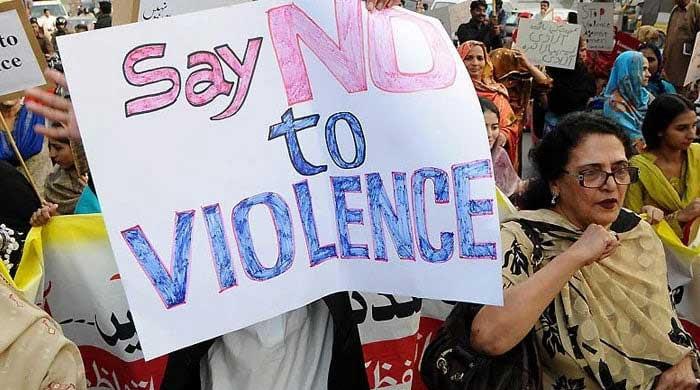Every year, the International Day for the Elimination of Violence against Women forces us to face a painful truth: violence against women in Pakistan is neither rare nor remote.
It takes place in ordinary homes, in the homes of people we know, among friends who smile through their pain and insist that they are okay, and in the lives of women who continue to move through each day with strength and grace while enduring much more than they ever revealed.
Many carry their emotional and physical wounds quietly, because speaking out often brings disbelief, judgment, or shame. And for those seeking justice, the process can be as painful as the violence itself, forcing them to relive their trauma in front of strangers.
According to police data, more than 32,000 cases of violence against women were reported in 2024. More than 5,000 women and girls were raped, more than 24,000 were kidnapped and 547 were killed in the name of honor. These numbers are worrying, but they also show that more families are reporting crimes rather than remaining silent.
The Pakistan Demographic and Health Survey indicates that nearly one in three married women have experienced physical, emotional or sexual violence at the hands of their spouse. Conviction rates remain low and women are often humiliated in the process. Many survivors describe the justice system as a second ordeal.
Our response must be firm, compassionate and rooted in the values we claim as a society. Islam emphasizes dignity, compassion and fairness within the family, guided by the Quranic instructions to live kindly with spouses. A house built on fear or cruelty contradicts this principle. Protecting vulnerable members of a household is both an Islamic and Pakistani responsibility.
It is in this moral and social context that the 2025 bill on the prevention and protection of domestic violence was drafted and adopted by the National Assembly. The bill recognizes that domestic violence is not limited to physical harm. Emotional bullying, psychological manipulation, verbal degradation, and economic coercion are equally harmful forms of abuse that undermine a person’s dignity and well-being.
As the author of this bill, I carried with me the voices of women who have never been able to access the system. I fought for this law because their silence was never a choice.
Each clause reflects a journey of resistance, perseverance and the belief that legislating must serve those who cannot fight for themselves. From its drafting to its adoption in the National Assembly, this project has been one of the most difficult and deeply personal legislative journeys of my public life.
To give meaning to protection, the bill creates protection committees across Islamabad to monitor cases and coordinate services. protection officers will help survivors file complaints, obtain medical examinations, access shelters, obtain emergency protection orders and understand their rights. For the first time, the burden shifts from the survivor to the state.
The bill empowers courts to issue immediate and emergency protection orders to prevent escalation and protect women and children. It requires hospitals, police and social services to coordinate their response so survivors are not sent from one office to another.
Recognizing that many remain in unsafe environments due to financial dependence, the bill introduces monetary relief and compensation for medical treatment, loss of income, relocation and emergency necessities.
This legislation is not limited to women. It extends protection to men, children, transgender people, older people, people with disabilities and any vulnerable people living in a household. Domestic violence can affect anyone, and every person deserves safety and dignity in their own home.
The bill also strengthens Pakistan’s constitutional responsibilities by ensuring the right to life, dignity and equality of all citizens. It fulfills the commitments that Pakistan has already made under CEDAW, the Convention on the Rights of the Child, the ICCPR, the Universal Declaration of Human Rights and the Sustainable Development Goals.
These are obligations that Pakistan has accepted willingly and proudly. Guiding this bill through the National Assembly has been one of the most important responsibilities of my public life. It reflects the courage of Pakistani women and the vision of Shaheed Mohtarma Benazir Bhutto, who believed that the dignity of women is inseparable from the dignity of the nation.
The Senate now bears responsibility for carrying out this reform. This bill is not about gender conflict, but about fairness, justice and the fundamental promise that every individual deserves security in their own home.
Implementation is where this law will stand or fail. Even the strictest legislation is meaningless if it is not enforced. Pakistan cannot afford a gap between what is written and what is delivered.
Every delay in appointing protection officers, activating protection committees, notifying rules or training frontline responders leaves survivors exposed and unprotected. Implementation is the dividing line between safety and harm, between justice achieved and justice denied.
It is a story of courage, responsibility and a Pakistan choosing a safer and more dignified path for all. If we commit to implementing this law with the seriousness it demands, thousands of women, children, transgender people, the elderly and vulnerable people will finally have a state that stands with them, not against them. The journey doesn’t end there.
This is where it really begins.
The writer is a member of the National Assembly. She holds a doctorate in law and serves on the special committee on Kashmir of the National Assembly.
Disclaimer: The views expressed in this article are those of the author and do not necessarily reflect the editorial policies of PK Press Club.tv.
Originally published in The News




